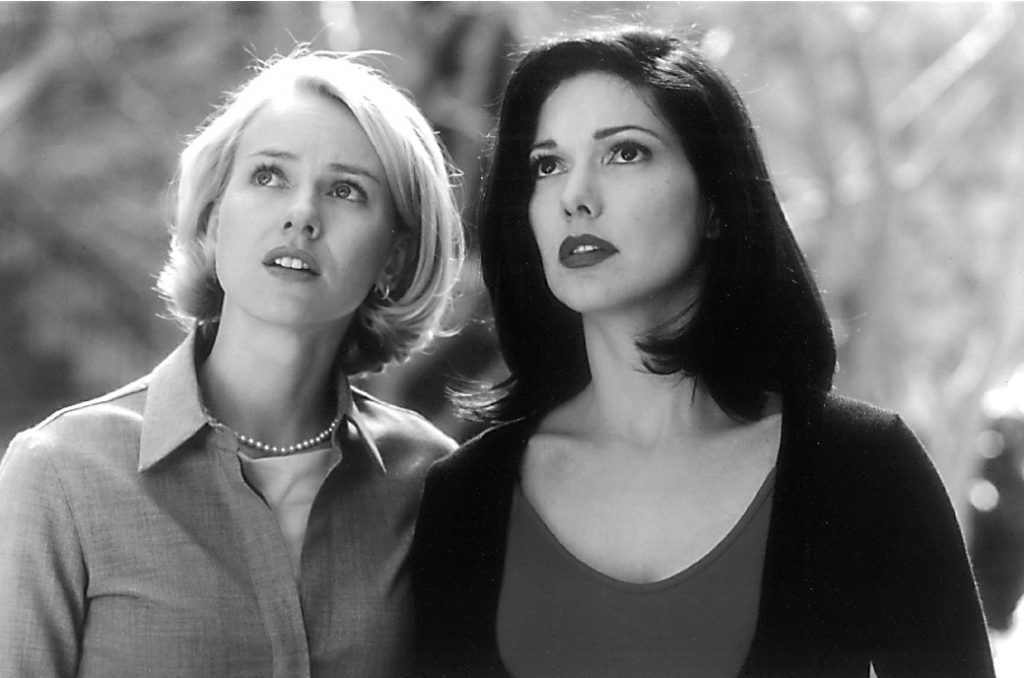
In many ways, 2001 marked another low for films, especially Hollywood. The glut of entirely forgettable and absolutely vapid films reached a new level of gridlock (The Fast and the Furious, Pearl Harbor, etc.), major pedigreed projects by auteurs like Spielberg, Mann, and Crowe fell flat on their faces, and unlike previous years, there is no epic picture poised to sweep the awards.
On the other hand, it was a fantastic year for film. Mavericks like David Lynch, Wes Anderson, the Coen brothers, and Robert Altman dropped some of the finest films of their careers. The foreign scene was fully alive, with vibrant films coming from Sweden, France, Vietnam, Britain, and Germany, and there were several extremely auspicious debuts by both actors and directors.
1. Mulholland Drive
David Lynch’s near epic of surreal, passionate, and visceral proportions was the most fully realized film experience of the year. Previously, Lynch had found his greatest success working in the confines of middle and rural America, channeling his youth (he grew up in Montana) into the jittery, hallucinogenic grandeur of Blue Velvet and Twin Peaks. When he delved into the new home of his dreams and nightmares, Los Angeles, the results were more uneven. Lost Highway was probably the most incoherent Lynch film ever, as it seemingly tried to top the weirdness factor and little else.
With Mulholland Drive, Lynch works with a stunning fluidity and comfort. Returning to his favorite Hitchcockian theme of light lady/dark lady, Lynch fashions a wormhole head-trip, leading the viewers into the recesses of Hollywood mysticism and erotica. Bewildering to many critics (who for some reason think that films have to be fully understandable after one viewing), Mulholland Drive is a puzzle of a film, for sure, but hardly a disjointed one. Lynch, with the support of Naomi Watts, Laura Elena Harring, Justin Theroux, and, yes, Billy Ray Cyrus, crafts the most palpable vision of failure, dreams, memory, passion, and ultimately betrayal at the hands of grand disappointment since the heyday of Luis Bunuel. Mulholland Drive is a brilliant, breathtaking American film, signifying both that there is hope for serious filmmaking within our borders and that America’s weirdest national treasure is working at full force.
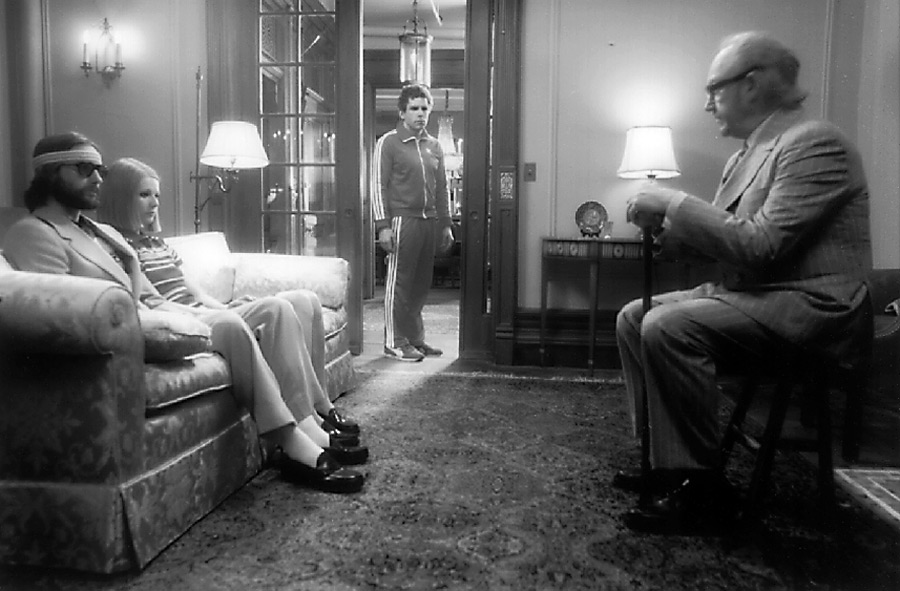
2. The Royal Tenenbaums
Wes Anderson is the ying to David Lynch’s yang. Both are absolutely original and seemingly inimitable, and both have no fear in jumping into the river of weirdness. But where Lynch kicks the bottom out and stares into the abyss of the bizarre, Anderson takes bittersweet comfort in the oddity of life.
The Royal Tenenbaums, the story of a dysfunctional family of geniuses split apart and held together by their cad of a father, grasps the small, yet seemingly massive theatrics of family with a startling clarity. Anderson’s magic is that through his characters’ idiosyncrasies, their comic-strip attire, and the obsessively cultivated world of kitsch they inhabit, they are never marginalized or made fun of. Anderson draws living, breathing characters, haunted by their pasts and paralyzed with their futures. The film bears the best ensemble cast of the year, with all the marquee players (Gwyneth Paltrow, Gene Hackman, Ben Stiller) sinking their teeth into their uncouth roles. Like Lukas Moodysson (see Together), Anderson is fascinated by the bighearted messiness of life—how often things need to be destroyed to turn out right.
3. Donnie Darko
Oh so quietly, Richard Kelley, a 25-year-old whiz kid, set several milestones with his debut of Donnie Darko. One of the best rookie efforts ever, Donnie Darko is a wholly original, enormously ambitious feature that I find potently resonating. Part sci-fi, part Catcher in the Rye coming-of-age tale, part 1980s egoism, Donnie Darko is nearly unclassifiable but also entirely cohesive, weaving a tapestry that’s similar to the best works of Atom Egoyan or Robert Altman hummed with a mythic spirituality.
Jake Gyllenhaal, a talented young actor, comes into his own with a performance of classic youth frustration. Noah Wyle, Drew Barrymore, Patrick Swayze,and Jenna Malone all add touching depth and poignancy to the film. In the end, Donnie Darko is unequivocally remarkable, an acerbically funny, thought-provoking film whose emotions are real and whose tragic implications are the most forceful of the year.
4. Amélie
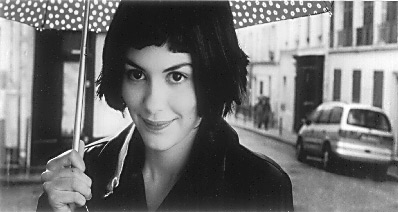
As I had thought, the Amélie backlash is beginning. Last month, Film Comment ripped the film to veritable shreds, and the Golden Globes passed Amélie up for the much more obscure No Man’s Land for Best Foreign Film. It seems that audiences and critics aren’t ready to flip for another foreign phenomenon so soon after Crouching Tiger, Hidden Dragon.
Amélie, however, is a completely enchanting film, a pop pastiche of French sensibilities, crafted by Jean Jeunet, a man unafraid of melodrama, slapstick, and the winds of destiny. Fusing early French New Wave lovey-dovey flippishness and the visual energy of silent films, Cocteau, and Jean Jacques Beneix, Jeunet lifts this ordinarily difficult story of a do-gooder to heights of sheer, irresistible charm. Unlike the mawkish Pay It Forward, Amélie, like the film’s namesake, understands that an unusual world requires unusual good deeds. Jeunet proceeds with a refreshingly playful spirit to treat a Paris that most certainly doesn’t exist as his personal playground for fun and mischief. It is easy to find reasons to hate Amélie for its “why me worry?” philosophy and naïve carpe diem attitude. Yet at a time when uplifting art is at a minimum output but at a maximum need, Amélie was the year’s most lovely elixir.
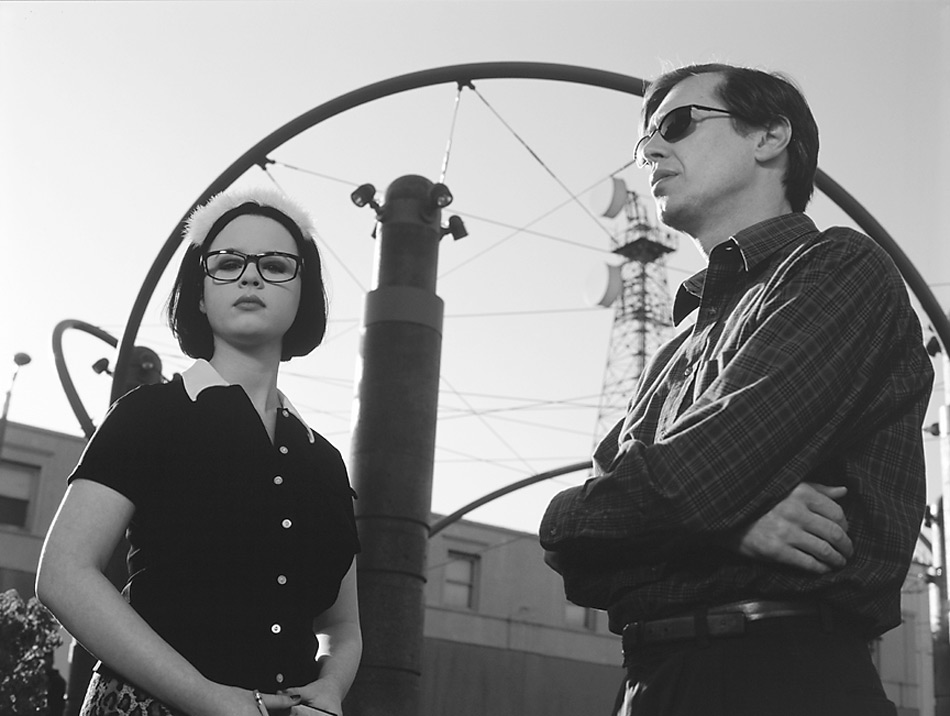
5. Ghost World
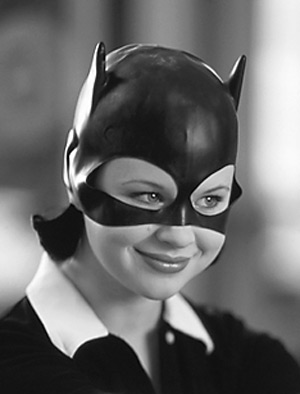
Terry Zwigoff, the director of Ghost World, and Daniel Clowes, the creator of the comic book on which the film was based, do not fit into today’s world. They do not understand the new trends and do not particularly like them, either. This is what Ghost World is about. For anyone who has ever felt burnt out, frustrated, or plain bewildered by the world around them, Ghost World is a bracing, hilarious film. Skewering the world with intelligence and acerbity, Ghost World follows the paths of the disaffected, the deflated, and the disillusioned.
The film, however, is not depressing, nor does it feel content to simply turn its back on modern life. Zwigoff and Clowes craft a message of individuality, of carving your own niche in the rough around you. Some found this depressing and cynical, but I found it to be one of the few honest comments on society amidst the glut of mindless cynicism and foolhardy sentimentality.
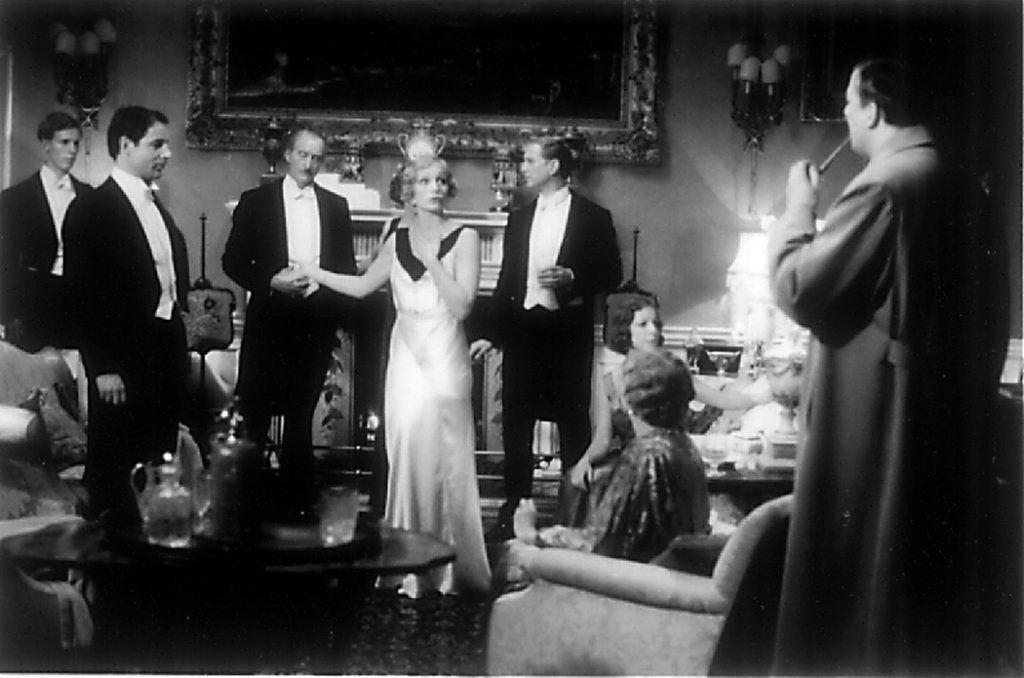
6. Gosford Park
Robert Altman is easily the most fascinating, maddening, and uneven director of the last 30 years. At his worst, his films are smug, vapid ruminations about things not particularly significant (1994’s awful Ready to Wear is a perfect example). At his best, as with Nashville, The Player, ShortCuts, and now Gosford Park, Altman is the most bracing humanist around, capturing scores of characters with a staggering off-hand fluidity.
Gosford Park is a triumph for Altman. Nearly 77, he is still working at the peak of his creative potency and has transposed his talents to foreign soil with the most success ever. In this case, it is an English country house circa 1932 and its disastrous hunting party. What makes Gosford Park so imminently watchable and whip smart is the way Altman eliminates all traces of nostalgic reverence and lets the stellar cast sink into depression, anxiety, and quiet nobility that feels as modern as anything in In The Bedroom. GosfordPark, like all great Altman films, needs to be seen more than once. But even after one viewing, it is impossible to deny the film’s poignant and hilarious impact.
7. Together
Lukas Moodysson is obviously an Altman fan, as his luminous, big-heartedfilm Together is like the sweetest film Altman never made. The settingis a Swedish commune circa 1975 that’s unraveling as egos inflate,tempers run high, and the ideals of the last decade begin to turn intobluster. The film is laugh-out-loud funny, but Moodysson also shows thegreatest empathy for his characters of any film this year. What was thelast American film that didn’t treat a wife beater like an absoluteanimal? In Together, Moodysson doesn’t excuse the actions of anyof his characters, but he is beautifully wary of passing judgment. Moodyssonis fascinated with contradictions, and the film expertly laughs at thelofty, sometimes achingly pretentious ideals of the commune, while simultaneouslyapplauding the characters for their idealism. The cast seamlessly interactwith each other with the raw energy of a Mike Leigh film. Like Amélie,Together is a genuinely uplifting film that dares to be sincere and sentimental,and succeeds with a quiet grandeur.
8. The Vertical Ray of the Sun, Battle Royale and In The Mood for Love
Asia, specifically China, Hong Kong, Vietnam, Taiwan, and Japan, areproducing some of the most challenging, beautiful, and intelligent filmsin the world today. The year 2000 brought the effervescent CrouchingTiger, Hidden Dragon and the massively brilliant Yi,Yi, both of which were amongthe five best films of the year. The year 2001 has given us three wildlydifferent but equally accomplished films from the Far East. TheVertical Ray of the Sun is Anh Hun Tran’s follow up to 1993’s gorgeousScent of Green Papaya. Tran, one of the world’s best purely visualdirectors, turns Hanoi into the most exotic, romantic place in the world.His simple tale of three sisters loving the struggle of life and relationshipsmiraculously makes the sleepy lull of everyday life seem like the mostsexy and wonderful thing in the world.
Battle Royale, a film that, sadly, may never be released in the U.S.,is one of the most vicious and potent satires I have ever seen, as itstale of junior high students forced to kill each other on an island seethescommentary on competition, youth violence, and the awful world of juniorhigh and high school.
In The Mood for Love, made by Hong Kong’s Wong Kar Wai, recallsYi, Yi in the way that it infuses immense elegy and romance into the lovelystory of two people, both married, inching towards each other. Together,these films offer an amazing display of the passion, intelligence, anddaring that Asia is taking right now. America should take notes.
9. In The Bedroom
Todd Field’s remarkable film of family, revenge, and unspeakabletragedy is not afraid of rawness or of moral ambiguity. It answers tothe call of realness and sincerity, and no other American drama was morecommitted than In the Bedroom. Following the lives of the Fowler familythrough an idyllic summer that is shattered forever by a dumb, violentact, Field and his stellar cast paint an image of staggering realism andepic force. Sissy Spacek and Tom Wilkinson deliver the two best performancesof the year, digging into their characters with a fierceness and dedicationthat is absolutely inspiring.
In the Bedroom is not a fun film, not light nor uplifting, but it isbeautiful, heartbreaking, and enormously watchable.
10. The Man Who Wasn’t There
The most consistent filmmakers in the world deliver again in 2001 withthe beguiling Man Who Wasn’t There. The Coen Brothers uber-laconic,ironic, yet heartbreaking film of murder, identity, and fading to blackrecalls the chilly existential breeze that made BartonFink and Miller’sCrossing such effective and atmospheric pieces. Sporting some of the verybest cinematography ever and steely, precise performances by Billy BobThornton, Frances McDormand, James Gandolfini, and Tony Shalhoub, TheMan Who Wasn’t There doesn’t so much mimic noir as it embodiesit, emulates it, lives it.
Many people criticize the Coens for being overly smug and ironic, butI think it is much more complex. The Coens recognize the biting absurdityof life, and much of their films are dominated with that. But they alsounderstand emotion, loss, and real heartbreak. In the case of TheMan Who Wasn’t There, it is the story of a man who decided to find himself,only to discover it is too late.
The Five Worst Movies of 2001
1. Pearl Harbor
Pearl Harbor was the most expensive greenlighted picture ever. With its massive marketing blitzkrieg and $5 million premiere party, the budget approached $200 million. There were magazine covers, tie-ins galore, MTV specials, even ludicrous Oscar predictions from director Michael Bay. The end result was something approximating a three-hour soap opera with the best cinematography you ever saw. Pearl Harbor is simply one of the most vapid, worthless, and flat-out boring films I have ever seen.
Historically it was not particularly accurate, as it tried to be both painstakingly PC and yet unflinchingly patriotic. Romantically and emotionally, the characters were flat cut-outs, messily glued together from a thousand previous archetypes. The only thing of real interest in the film is the actual attack, but after September 11th, the thrill of seeing a historical sneak attack, pumped up and fetishized for the big screen, seemed, I don’t know, just depressing.
2. Snatch
If it weren’t for the horror that is Pearl Harbor, Snatch would easily have been number one on this list. My hatred for this movie is nearly unrivaled. Why? Because it is derivative, unimaginative pulp that believes a film is cool just because it deals with tough thugs and has a kitsch R&B soundtrack.
Director Guy Ritchie has been praised as a talented writer and someone with a keen visual flair. He is neither. The jokes in the film consist of one character saying something dumb and another going “for @#%#’s sake!,” but see, it’s funny because they have British accents.
His visual tricks, like freeze-frame narration—well, Mankiwiez used that about 52 years ago in All About Eve. How about the action slowed down to a dreamlike pace? Jean Vigo was doing that in 1933. Richie has also been compared to Quentin Tarantino, but there’s a big difference. Films like Pulp Fiction turn kitsch inside out, and craft their own universe of caricatures and mythic figures that somehow in the end get to you. Ritchie’s films are a barren wasteland of amped up throwaway lines. If you want a good British crime film, rent Get Carter, Mona Lisa, or Sexy Beast. As for Ritchie, well, he can fade to black.
3. Hannibal
This one had the makings to be stellar. The same cast, except for one of the best replacements ever in Julianne Moore, and a director (Ridley Scott) with a potent and visceral style and juicy, dark material to work with. But, unlike The Silence of the Lambs, that deftly floated into serious commentary on violence, sex, and gender while being one of the best thrillers ever, Hannibal was little more than an elaborate slasher film. Preposterously symbolic and heavy handed, grotesquely and inconveniently violent and flat-out boring in many parts, Hannibal railroaded the Lecter franchise, from the grand and mythic creepiness of Manhunter and The Silence of the Lambs to a critical albatross for MGM, Anthony Hopkins, and everyone else involved with this year’s Red Dragon. The shame, the shame.
4. Blow
Blow had the coolest trailer of the year, a tri-screened freeze-frame-a-thon that made the film look like the second coming of Boogie Nights. The actual result, however, was far soggier. Blow is the worst kind of bio-pic: it neither relishes its distinct historical period nor does it penetrate its subject, cocaine founder George Jung, with even a trace of objectivism or grit. Instead of a story on how cocaine hit and ravaged America, we get the story of a poor dreamer who rises to riches only to be duped by the women in his life. The late director Ted Demme tries to infuse the film with an edgy, wild sensibility, but it’s for naught. Blow is a tepid, empty film that was depressing for its mediocrity.
5. Swordfish
At the time, Swordfish seemed like a fine summer diversion, but in retrospect it is the essence of icky Hollywood violence and nihilism. With a story line that was as muddled and confusing as it was paper thin, Swordfish relied exclusively on slick violence, cars, and sex. While these elements are seemingly necessary for any successful action film, they were the only elements of Swordfish. It was yet again a perfect example of the Tower of Babel style of Hollywood filmmaking, in which millions of dollars are spent on films with no soul.
